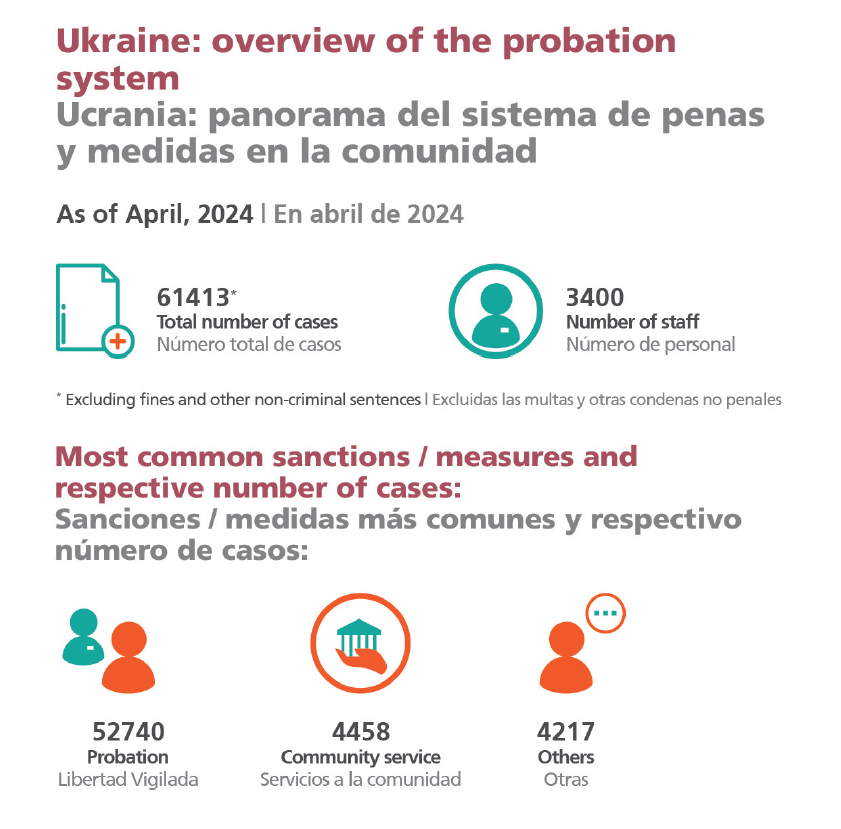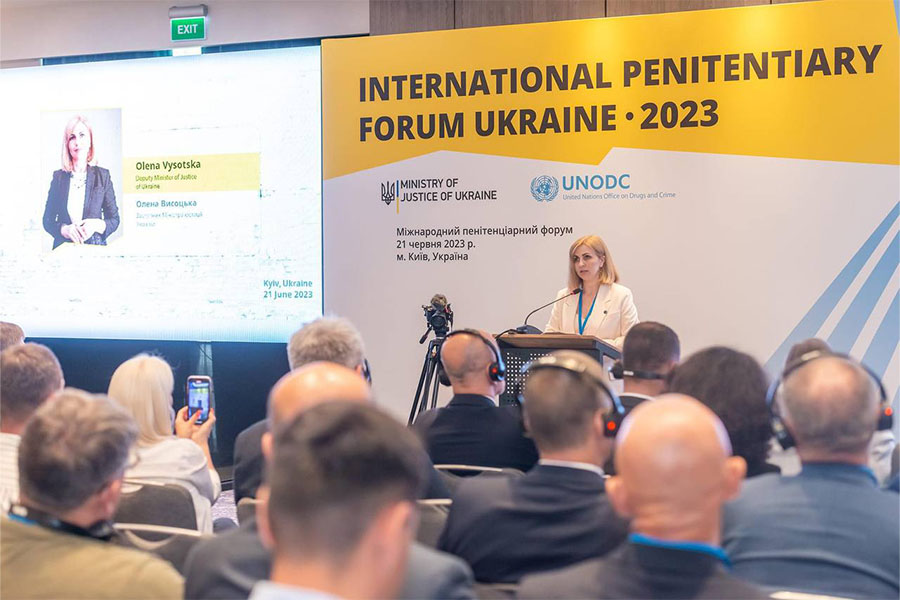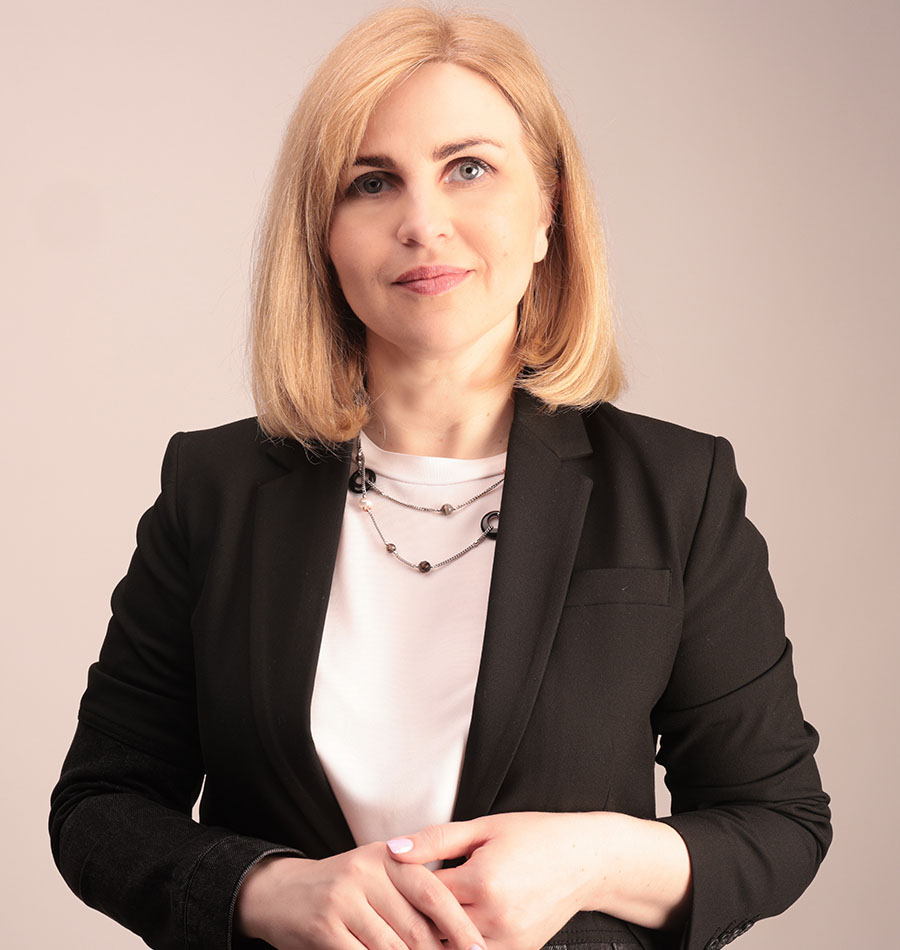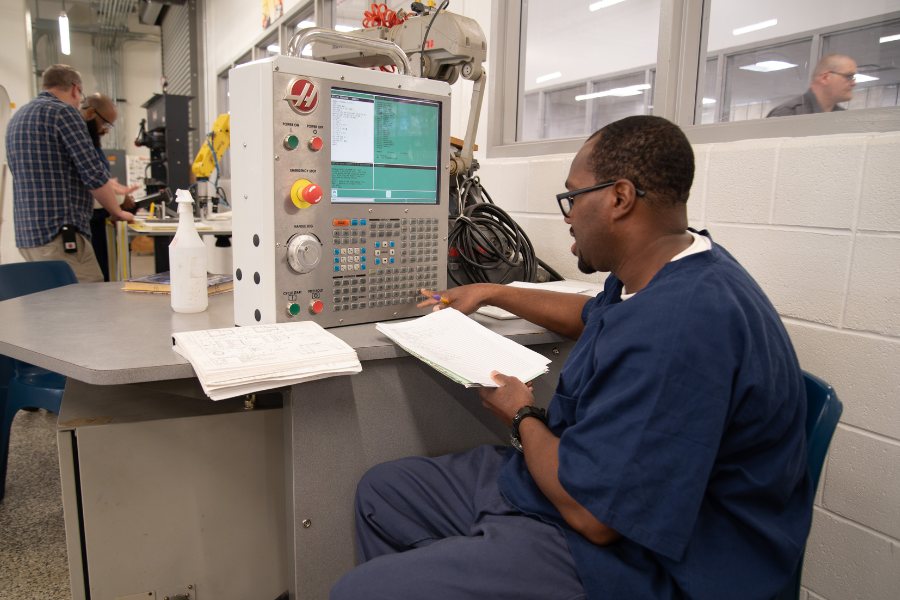Interview
Olena Vysotska
Deputy Minister of Justice of Ukraine
In this interview, Olena Vysotska, Deputy Minister of Justice of Ukraine, discusses the state of Ukraine’s justice system during the ongoing conflict. She addresses the war’s impact on prisons, the management of Ukrainian convicts and Russian prisoners of war, and international support received from organisations such as the UNODC and the Red Cross.
Despite wartime challenges, Deputy Minister Vysotska highlights ongoing reforms aimed at improving prison conditions, enhancing probation services, and meeting international standards.
Can you describe the current panorama of Ukraine’s justice
system, especially concerning prisons and probation services, in the
context of the ongoing conflict?
OV: Like all areas under the Ministry of Justice, Ukraine’s prison system is currently balancing between addressing new basic needs caused by the war and undertaking reforms to comply with international and European reintegration standards.
We began working with a system that had long-standing problems with funding, which did not allow for the modernisation of old infrastructure, and outdated treatment and resocialisation approaches – all remnants of the Soviet totalitarian system, which destroyed the lives of those ending up behind bars.
It was in 2019 that the horizons of prison reform focused on these key problems. By the following year, however, the task of overhauling the philosophy and management of prisons received an additional challenge with the COVID-19 pandemic. We faced this challenge head-on and expanded our scope of responsibilities.
Yet, two years later, the problems stemming from the global pandemic, which complicated both the operations of prison staff and the lives of the prison population, seemed insignificant as compared to what followed. After all, the largest war in the world had begun against Ukraine, for the first time since World War II.
Today, the correctional system in Ukraine, which operated over 100 prison facilities before the war and cared for the fate of about 50,000 prisoners and 20,000 probation clients, now functions under constant security and humanitarian threats.
Over 300 structures in 27 institutions were damaged as a result of Russian strikes, with 5 prisons completely destroyed, and several employees and convicts killed.
Residents of 12 facilities (about 4,000 prisoners) were evacuated to safer areas, while 11 facilities (with approximately 3,500 people) were under temporary occupation – four of these were later reclaimed by Ukrainian forces, but the convicts were taken by Russia.
The abduction of convicts –civilians forcibly taken to territories controlled by Russia– presents another challenge for the country, to effectively return these individuals from captivity. Other issues such as interruptions in power and water supply pale in comparison.
Against this backdrop, the financial constraints of a poor country forced to defend against a heavily armed enemy are significant, impacting the support required to maintain prison operations during the war. Additionally, the Ukrainian prison system has seen an unexpected rise in population with the addition of Russian prisoners of war, a significant number of whom were previously incarcerated in Russian prisons and conscripted into their assault units.
I must say that I am proud of the resilience of the Ukrainian people, and especially the penitentiary system staff. During the most critical days, not a single unit was left without administration or staff.
Like all Ukrainians, the staff supported each other by transporting families to safer areas, distributing humanitarian aid, and finding accommodations after forced evacuations. The large and complex system maintained control and manageability during these critical moments.
The convicts also demonstrated their patriotic stance. Despite Russia’s attempts to destabilise the situation and incite disobedience and riots, the Ukrainian prisoners honourably passed these tests with no acts of disobedience. Thousands of applications for mobilisation were submitted by the convicts, and they created numerous patriotic works of art in support of Ukraine.

JT: In December 2022, the United Nations Office on Drugs and Crime (UNODC) visited Kyiv to assess the needs of Ukraine’s State Penitentiary and Probation Services amidst the conflict. This visit led to the proposal of a new programme, Penitentiary Assistance, in response to the Armed Conflict and Emergency Needs in Ukraine (PACE.UA), aimed at integrating prison and offender management into the humanitarian response in Ukraine, among other goals.
How has international support helped the penitentiary system to ensure the security and basic needs of staff and incarcerated individuals?
OV: We are expanding our cooperation with donors, considering the specifics of their mandate and interests, based on the priorities of our prison system.
Indeed, the International Committee of the Red Cross has provided significant humanitarian support. They purchased and delivered 49 generators, a large quantity of building materials and equipment, fuel, medicines, and essentials for prisoners and prisoners of war, valued at over 1 million Euros.
The Global Fund greatly assists us in meeting the medical needs of our prisoners. The new UNODC PACE.UA project will combine technical assistance with energy supply, heating, and water, and will equip prisons with IT systems and communication systems, security equipment, and other tools to improve the emergency response. We also asked for expert assistance to enhance individual assessment and differentiation in working with various prisoner categories and the development of tools for social rehabilitation.
Through the efforts of this donor, we now have a Ukrainian online course on the Mandela Rules for prison staff training, and expert guidance on modernised means of movement restriction, which is relevant from a security perspective.
In June 2023, with the support of UNODC, a bold and large-scale event was held in Kyiv, bringing together European prison authorities and international organisations focused on working with sites of deprivation of liberty. This event demonstrated the will and support provided to assist Ukraine on humanitarian issues during the war and to reform the system.
I wish to thank Ukraine’s partners and international donors. In clearly difficult times, our justice system feels your support and remains committed to the humanitarian goals of transforming the prison system to meet international standards. Without their help, Ukraine’s large and densely populated prison system will not withstand the incredible trials of wartime.
We also hope that the international community will influence the enemy to ensure the humane treatment of Ukrainian military personnel in captivity.

What new challenges does the Ministry of Justice face in its new
role of overseeing prisoners of war?
OV: The detention of prisoners of war represents a new and important, albeit temporary, task of the Ukrainian system. Having practically studied the Geneva Conventions, we have learned and adopted its main principle –not to hold prisoners of war in prison conditions and to assign different responsibilities to the staff working with them.
In Ukraine, several precincts have been created for the detention of prisoners of war, where they are held separately from other prisoners and camps.
The precincts serve the logistical function of temporary points on the way to internment camps, which we have prepared in full compliance with international humanitarian law.
Each camp undergoes renovations with the resources of Ukraine and international organisations, mainly the International Committee of the Red Cross, both before opening and while in operation.
The staff also undergoes basic training and additional ongoing support. From day one, we have been completely transparent with the UN Mission, the International Committee of the Red Cross, and any international organisations with mandates to work with prisoners of war. We also allow international journalists to visit these prisoners.
It is crucial for us that they witness the conditions in which Russian prisoners of war are held in Ukraine and how they are treated, to engrave the understanding that Ukraine differs from Russia in memory and on international platforms. And no matter how hard it may be for us, Russian prisoners of war are treated humanely.

How is the Ministry of Justice managing to balance the urgent needs created by the conflict with its long-term reform and modernisation initiatives?
OV: Despite the difficult wartime conditions, we have not forgotten about our mission. In addition to ensuring the daily functioning of prisons, we strive for improvements in conditions and work approaches. The government-adopted Strategy for Reforming the Penitentiary System serves as our roadmap until 2026.
Its operational plan considers the current wartime realities and life within the system. Despite current difficulties, the goals of the first annual plan have been completed. How do we find resources for this during wartime? Generally, as occurred before the war, our budget has never fully met our needs.
We continue to focus on economic processes, developing projects to stimulate the work of convicts and to encourage prison production. We use creative thinking to secure funding, always adhering to human rights and anti-corruption mechanisms. And we work with international donors.
Last year we equipped more than 2,000 beds for prisoners to meet international standards, not considering institutions holding prisoners of war, which are immediately equipped, in accordance with the Geneva Conventions. Despite overcrowding difficulties, especially in pre-trial detention centres, and due to the evacuation of prisoners from frontline areas, we have implemented projects that provide prisoners with more living space, exceeding national standards.
Due to the challenges of war, we have equipped emergency and alternative sources of electricity and water, and food preparation capabilities in case of blackouts, using international aid resources.
We also continue to promote large-scale initiatives that were started during the pre-war period. We have plans for constructing two new modern pre-trial detention centres in Kyiv and Lviv, and a new penitentiary institution that reflects contemporary prison engineering concepts in the centre of Ukraine.
To fund these projects, we have sold previously closed prison facilities at transparent auctions. We do not forget about changes in prison philosophy and management. During the two years of war, we have implemented numerous initiatives to improve legislation, resocialisation, and security in correctional institutions.
We have introduced multi-regime institutions, adopted legislative changes for the early release of life-sentence holders, and other modifications for the systemic implementation of decisions of the European Court of Human Rights. We apply the principles of dynamic security and torture prevention. To ensure effective correctional administration, we are also digitising prison management.
We look to European countries as models for reforming our prison system, carefully studying and implementing their experiences.

JT: In collaboration with international partners, the Ministry of Justice of Ukraine has been focusing on enhancing probation services and broadening the use of alternative sanctions.
What advances have been made to strengthen probation services and increase the use of alternative sanctions in Ukraine?
OV: Probation helps offenders adapt to an honest life in society without imprisonment. It is less costly than imprisonment for the state, and it enables the convicted person to maintain family ties, work, their housing situation, etc. Probation has proven its effectiveness as a viable alternative to imprisonment.
Today, the Ukrainian probation system is supported by its own legislation, a modern IT system, and progressive working tools, including risk assessment and correctional programmes.
Our state “Probation Centre” institution is staffed by 3,400 employees across 554 separate units throughout Ukraine. The success of probation depends largely on their expertise since they play a critical role in guiding those who have received alternative punishments towards rehabilitation. In practice, 90% of the probation system recommendations are applied in court decisions. Currently, the number of individuals registered with the probation authorities is twice the number of convicts in prisons.
Recently, a law was enacted to introduce probationary supervision as a new type of alternative sanction to imprisonment. This initiative is part of the milestones for the development of alternative sanctions in the Strategy for Reforming the Penitentiary System of Ukraine.
Looking ahead, beyond expanding the use of alternative sentences, the focus on developing probation services over the coming years includes the enhancement of the IT infrastructure, improvement and development of probation tools (programmes, risk assessment, special consultations and assistance).
In addition, we aim to create a modern and flexible staff training and development system and to increase our communication regarding the advantages of probation as compared to traditional imprisonment.

JT: The Council of Europe (CoE) has also been a crucial partner in supporting prison reform in Ukraine, with projects such as SPERU+ aiming to shift the penitentiary system towards a more rehabilitative approach. Since the completion of SPERU+ this partnership is continuing with a new project, DECOPRIS, which focuses on improving detention conditions and reducing reoffending.
Can you share some of the successes achieved by the Council of Europe’s SPERU+ project, and the key objectives for the upcoming DECOPRIS project?
OV: In cooperation with the SPERU+ project, we have achieved significant results in the implementation of resocialisation tools and the integration of international standards into the practical activities of our correctional institutions.
Since the programme’s inception in 2021, we have introduced special programmes for working with prisoners, including “Problem Solving”, “Supporting Family Ties”, and programmes for individuals using psychoactive substances. Additionally, a manual has been developed to provide psychological and psychosocial support to individuals at risk of suicide, along with an expert study aimed at improving the involvement of incarcerated persons in work programmes.
We have also conducted numerous training events to initiate these correctional programmes and other expert qualifications, such as a training series on recidivism risk assessment and the development of individualised working plans. Furthermore, the project facilitated the acquisition of necessary equipment for psychologists working in our facilities.
At the beginning of 2024, the launch of a new Council of Europe project, “DECOPRIS – Towards more humane detention conditions and reducing reoffending in Ukraine” aimed at strengthening the protection of prisoners’ rights through the improvement of the quality of prison management and the rehabilitation of prisoners in Ukraine.
The main activities planned for the project include the implementation of rehabilitation programmes, tools for effective prison management, staff training on dynamic security, and the creation of a therapeutic department for working with convicts having drug or alcohol addiction issues.
Olena Vysotska
Deputy Minister of Justice of Ukraine
Olena Vysotska has served as Deputy Minister of Justice of Ukraine since 13 March 2020. She made history as the first woman to coordinate the country’s penitentiary service. Olena holds a PhD in Law and a second degree in Finance. Her service for the government began in December 2019 when she headed the Secretariat of the State Secretary of the Ministry of Justice of Ukraine, a position that she held until March 2020.
Advertisement



